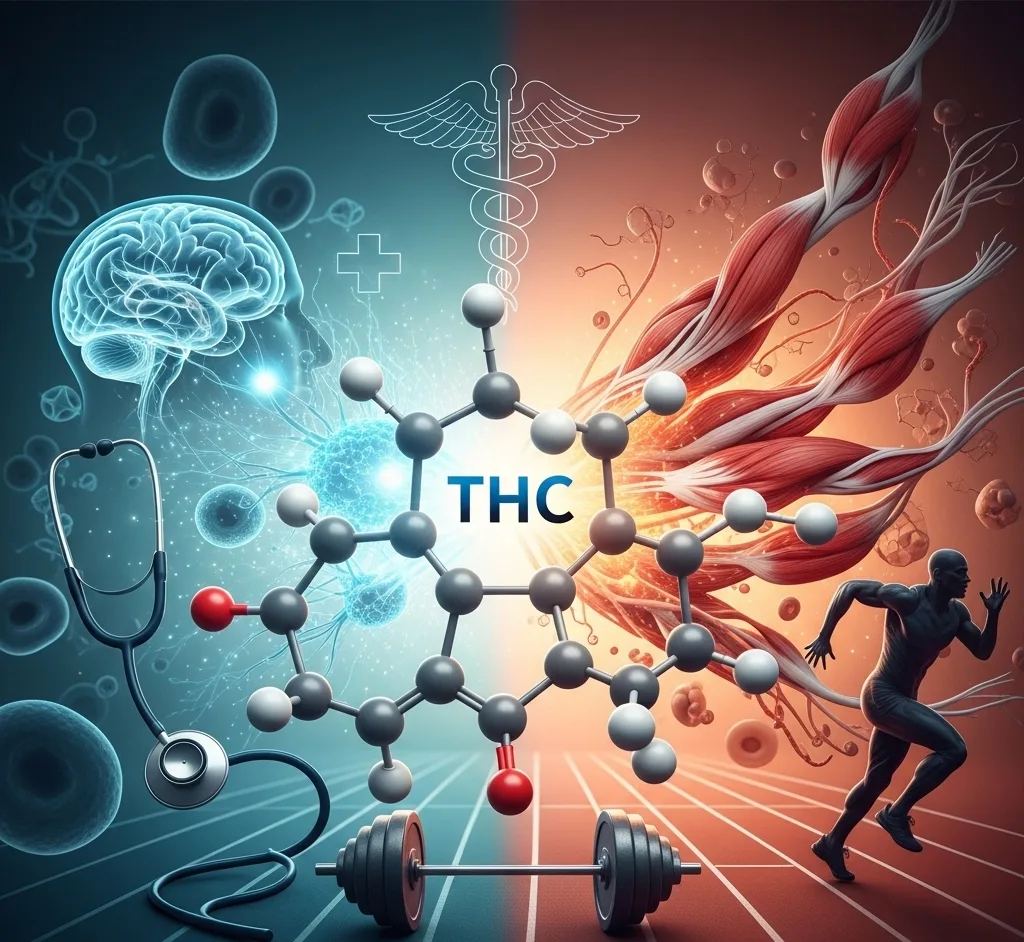Tetrahydrocannabinol, or THC, is the primary psychoactive compound found in the Cannabis plant. While often associated with recreational use, THC and its counterpart, Cannabidiol (CBD), are subjects of intense scientific and medical research. For athletes and individuals focused on fitness, understanding the full spectrum of THC's effects—from its impact on performance and recovery to its long-term health implications—is crucial.
What is THC?
THC is a lipid molecule believed to be a key part of the Cannabis plant's natural defense system, protecting it from threats like insect predation, ultraviolet light, and environmental stress. When consumed by humans, THC interacts with the body's endocannabinoid system, a complex network of cannabinoid receptors (CB1 and CB2) located on cells throughout the body and brain.
These receptors are particularly concentrated in brain regions responsible for thinking, memory, pleasure, coordination, and time perception. When THC binds to and activates these receptors, it can affect a person's memory, concentration, movements, and sensory perception. This interaction is also linked to the release of dopamine, a neurotransmitter associated with pleasure and reward.
THC and the Medical Field
Beyond its psychoactive effects, THC has been studied for its potential medical applications. Research has explored its role in:
Cancer Treatment: Some studies suggest that cannabinoids may have a role in fighting cancer by binding to CB1 and CB2 receptors.
Glaucoma and Intraocular Pressure (IOP): Glaucoma is a common eye condition caused by fluid buildup and increased pressure inside the eye, which can damage the optic nerve and lead to vision loss. Research has shown that THC can temporarily reduce intraocular pressure, though this is not a long-term treatment.
Pain Management and Soreness: Some users report that THC helps make post-workout muscle soreness more controllable.
Appetite Stimulation: THC is known to help stimulate appetite, which can be beneficial for individuals dealing with certain medical conditions that suppress hunger.
Sleep and Anxiety: THC is often used to help with sleep problems and can have an anxiolytic (anxiety-reducing) effect for some individuals.
THC and Athletic Performance
The intersection of THC and sports is a complex and highly debated topic. The World Anti-Doping Agency (WADA) has banned THC, citing two main concerns:
Safety: THC can impair judgment, coordination, and focus. This can be dangerous for athletes and others, as poor decision-making can lead to accidents and injuries. A personal anecdote highlights this: smoking before a workout led to a significant decrease in strength and overall performance (30-40% weaker than normal), suggesting a negative impact on a strenuous activity.
Performance Enhancement: While some argue it's not a performance enhancer, others believe it offers a competitive advantage. WADA reports that 25% of positive drug cases, after anabolic steroids, are related to cannabinoids. Its potential benefits might include:
Pain Relief: Making it easier to push through discomfort and soreness.
Anger Control and Mood Regulation: A calmer, more controlled state of mind during competition.
Hormonal and Physiological Effects
When it comes to the anabolic side of things—muscle growth and fat burn—the research on THC's long-term effects is mixed and requires more study:
Testosterone and Estrogen: Some studies show a temporary decrease in testosterone levels after smoking, with levels returning to normal afterward. Other research suggests that estrogen levels might be affected, with some studies showing a decrease and others showing a significant increase. The contradictory nature of these findings highlights the need for more conclusive research.
Growth Hormone (GH): Current research does not indicate a significant effect on Growth Hormone levels.
Cortisol: THC's effect on cortisol, the body's primary stress hormone, is generally considered to be minimal.
Cardiovascular Health: THC can affect blood pressure and heart rate, which could be a concern for individuals with pre-existing heart conditions.
The Bottom Line
THC can offer a range of temporary effects, from mood regulation and appetite stimulation to potential benefits for soreness and sleep. However, its use in a fitness context comes with a number of cautions. The potential for impaired decision-making, decreased focus, and compromised physical performance during a workout is a significant drawback for anyone serious about their training.
The long-term effects on hormonal balance, particularly concerning testosterone and estrogen, are not yet fully understood and require more definitive research. As with any substance, the dosage and frequency of use are critical factors, and the risk of dependency is a real concern that should be taken seriously.
It’s important to balance the potential benefits with the known risks and understand that for athletes, the WADA ban and the potential for a negative impact on performance make it a complicated substance to integrate into a training regimen.

